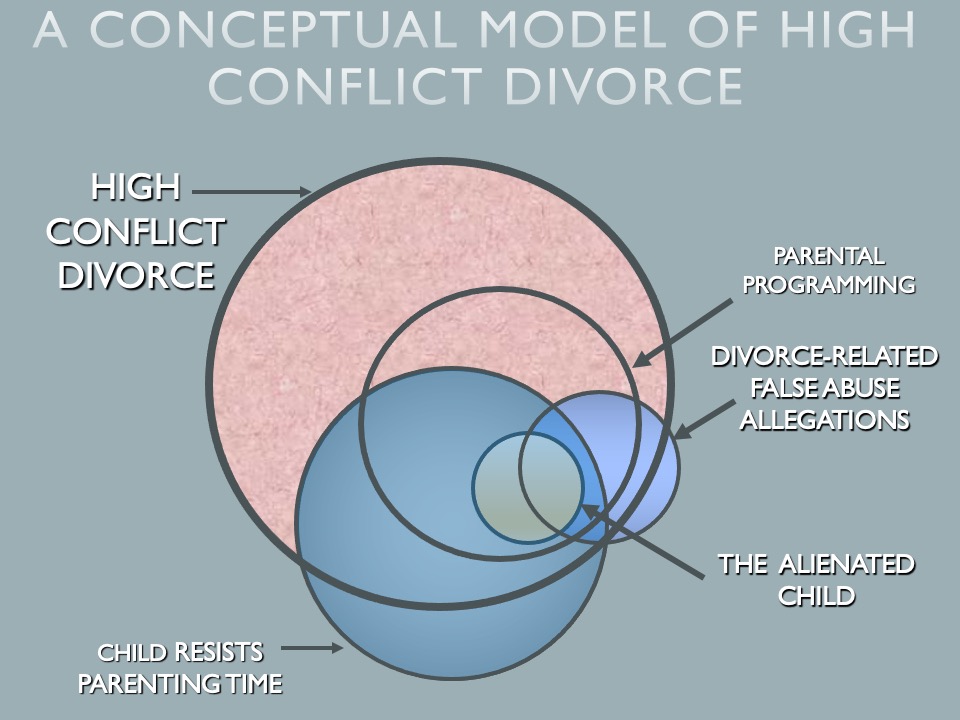Naming and Blaming
Part of the reason for my rejection of pathology as a cause of these problems is that we, therapists, lawyers, custody evaluators, and court personnel often get caught up in these same cycles of blaming these parties.
Therapists often assign labels to them. Forensic psychologists and attorneys will too often allocate 100% of the blame to one side or the other, or write a one-sided report, or a slanted motion, citing only positives about one parent and only negatives about the other.
Therapists and attorneys far too often use terms like:
character disorder
sadist
emotional, verbal or physical abuser
alcoholic, drug abuser
narcissistic, borderline, or manic-depressive
This is for people they’ve never met or properly evaluated.
Our colleagues (and even patients) use terms like Richard Gardner’s ‘Parental Alienation Syndrome,’ (Gardner, 1992a), ‘False Sexual Abuse’ (Gardner, 1992b) or ‘Divorce-Related Malicious Mother Syndrome’.
When we say that a ‘Parental Alienation Syndrome’ is present, what we are saying is that there is an alienating parent who has brainwashed the children and is to blame for the problem (all problems). There is also a target parent who is a blameless victim. Dr. Turkat, who proposed the concept of Divorce-Related Malicious Mother Syndrome, refers to the custodial parent, in cases of PAS, as “suffering from a Parental Alienation Syndrome,” as if this were a diagnosable mental disorder suffered by the parent. He feels that this alienator should be punished, but is often just given a slap on “her” wrist. I do not agree.
I suggest that you read Johnston and Kelly’s excellent formulation of The Alienated Child ,which takes a completely different view, a view in which I agree. They focus on the child’s difficulties rather than focusing on blaming or punishing one parent. We shouldn’t reflexively assume that a child who resists contact with a parent is the victim of an immoral and manipulative alienator.

Children are frequently allied with one parent or prefer one parent over the other. They can reject a parent for a variety of reasons, including that parent’s own behavior towards the child or towards the former spouse.
And, in some cases, a child can harbor distorted and exaggerated negative views of a rejected parent, this being due to a variety of factors, including alienating behaviors from the parent with whom the child becomes aligned.
In one case an attorney without any clinical credentials tried to convince a judge that a woman I had evaluated suffered from “Antisocial Personality Disorder,” in spite of my expert opinion to the contrary. After all, he argued, hadn’t the patient shown a spike on the MMPI-2 Psychopathic Deviate scale? How could joint custody continue with an ‘antisocial’ woman? (she wasn’t an antisocial woman).
What about motions for custody, or to diminish or suspend or supervise parenting time? These are too often masterpieces of blaming: distortion, exaggeration and half-truth.
Let me share just one example: A mother filed for a Personal Protection Order and sole physical custody, two years after her divorce. Her motions begin with the allegation that the father “continues to threaten to kill” the mother. I was appointed to do an evaluation.
Well, I asked the mother about the threats I discovered that no threats- direct or indirect, verbal or gestural threats- had actually occurred. But she felt afraid of her ex-husband, she said. He had been ‘abusive‘ during the marriage, she claimed, and the children are ‘afraid of him,’ she said. That’s it. The ‘abuse’ claims were as paper-thin as the ‘threats’ and the children’s alleged fears of him, Mom wouldn’t accept the conclusion that her statement was a false or inaccurate one. It was justified, she said because of her ‘fear.’
So we all can do it, sometimes. How? And what can we do about it?